Secret Door reveals its king and romantic killer
by javabeans
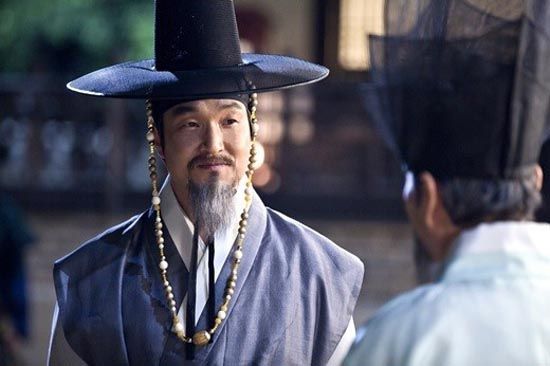
I am pretty pumped up about SBS’s upcoming historical drama Secret Door, half because that the cast is amazing, and half because it’s a gruesomely fascinating slice of history rife with pathos and emotion—and a heckuva mystery, as nobody has the definitive explanation for what caused Crown Prince Sado (played here by Lee Je-hoon) to become so dangerously violent and what prompted his father, King Yeongjo (Han Seok-kyu), to order him to step into his own death by spending eight days locked inside a rice chest.
This is a story that grabs you right from the one-sentence logline, then gets progressively more compelling the more you read about it. I’ve been reading the Memoirs of Lady Hyegyong, the first-person account of the life of Sado’s wife, and it’s riveting stuff; I recommend the book to anyone who wants to know more. (You can get it on Amazon.)
In this set of stills, first we have Han Seok-kyu as the forceful, exacting king whom his son is desperate to please. Sado (born Lee Sun) is the idealistic opposite of his father, dreaming of a world where all people are equal while Yeongjo works toward protecting his power. This puts them into constant tension, adding to the already conflicted father-son dynamic.
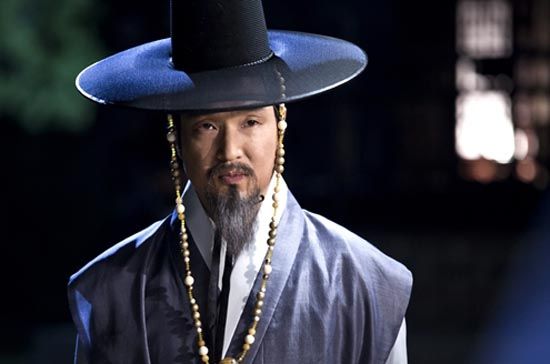
Then in the stills below that, we have Kim Min-jong playing a “king of the night” character, aka a legendary swordsman, who also has a hidden innocent side as a reader of romance novels. (Really!) Although truth be told, Romantic Oppa being a fan of romance is hardly a shocker to me; it’ll be more fun to see him being the badass killer.
Kim Min-jong’s character meets the prince’s acquaintance while hunting down the truth in a tragic case, and they’ll gradually become rather close. That also goes for the character played by Kim Yoo-jung, who is the only one who knows of Kim Min-jong’s secret love of romance stories, and together they’ll get entangled in “gripping events.” It’s a vague description, but then again, the history is pretty famous so we already know the major points. And yes, I agree that they’re gripping.
Maybe I’m just on a sageuk bender these days, or maybe it’s the mystique of Prince Sado, or maybe it’s Lee Je-hoon (and Han Seok-kyu and Park Eun-bin), or maybe this drama is just a smorgasbord of things that get me excited. In any case, I’m crossing my fingers and toes that the drama does justice to the complexity of the real events, and that it won’t make me sad for getting my hopes so far up.
Secret Door is written by Yoon Seon-joo, who wrote sageuk dramas Immortal Lee Soon-shin, Hwang Jini, and The Great King Sejong; directing is PD Kim Hyung-shik of Sign, Ghost, and Suspicious Housekeeper. The drama will follow Temptation and premieres on September 22.
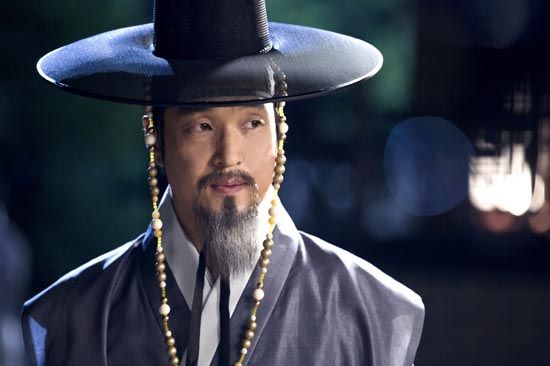
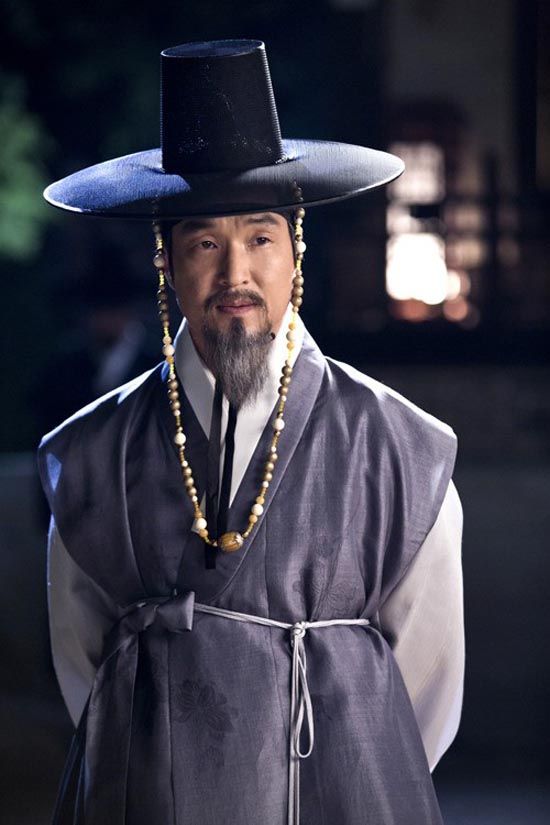
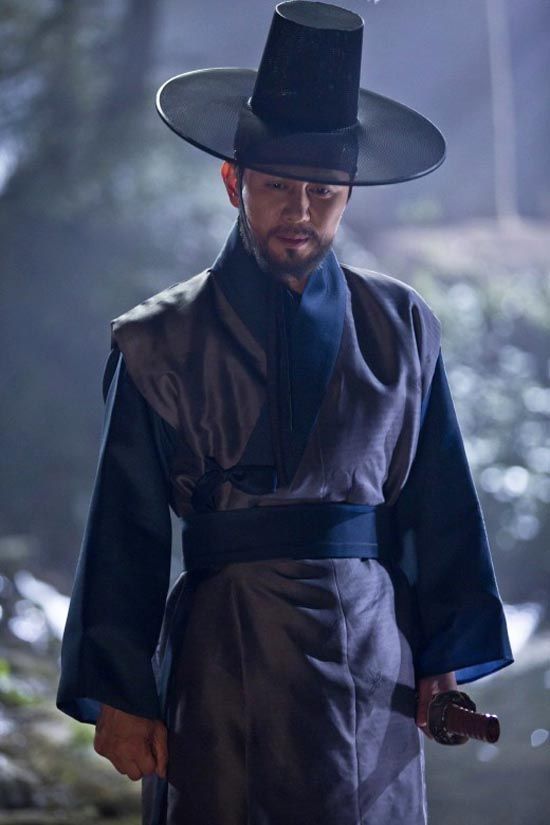
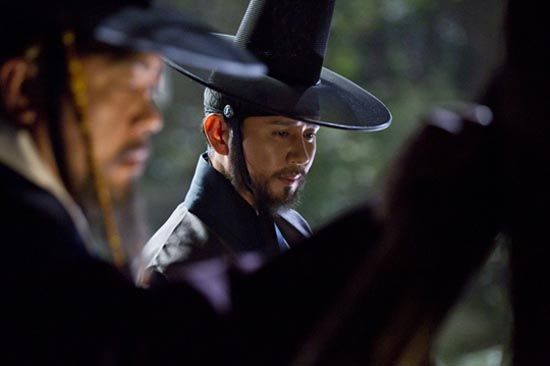
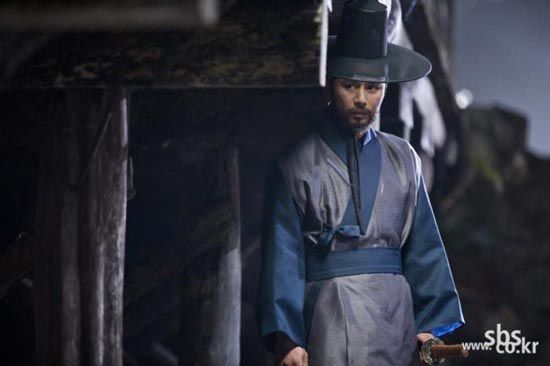
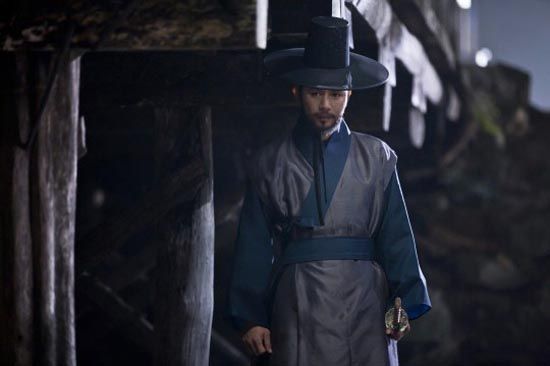
RELATED POSTS
- Secret Door’s prince in action
- Lee Je-hoon’s first day on set as Crown Prince Sado
- Kim Yoo-jung on the set of Secret Door
- Park Eun-bin confirms Secret Door
- Seo Joon-young reunites with co-stars in Secret Door
- Kim Yoo-jung scores leading role in Secret Door
- Lee Je-hoon confirms drama return with Secret Door
- Kim Min-jong joins Secret Door as cold-blooded killer
Tags: Han Seok-kyu, Kim Min-jong, Secret Door
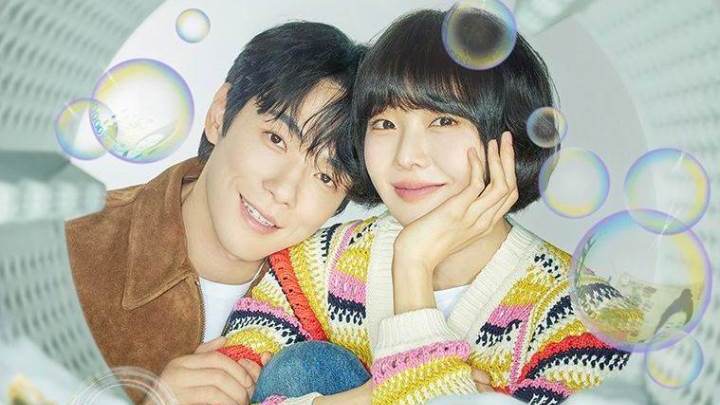







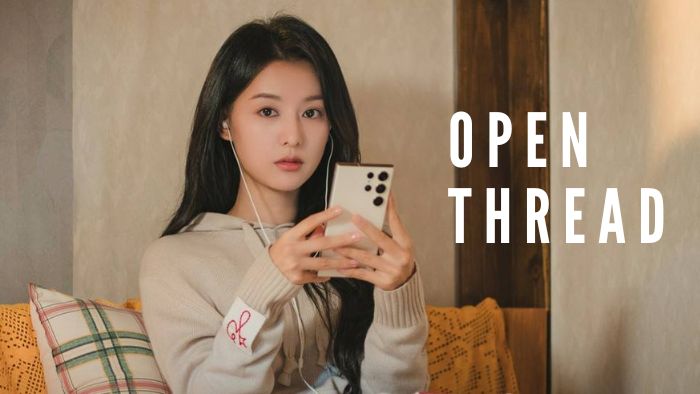

Required fields are marked *
Your email address will not be published. Required fields are marked *
1 mary
August 26, 2014 at 9:24 AM
Seeing Han Seok-kyu here just gives me so much TWDR feels, which... T^T
Required fields are marked *
hipployta
August 26, 2014 at 10:32 AM
My exact same reaction
Required fields are marked *
Yuna
August 26, 2014 at 10:44 AM
But I think in Secret Door his character is going to be quite opposite of the one in TWDR. Here he will be playing a selfish and ruthless king right?...:(
Required fields are marked *
Shelley
August 27, 2014 at 5:46 PM
King Yeongjo was a very complicated person... He was a benevolent monarch who cared about his people, but allegedly put too much pressure on his son to succeed and do well (hence Sado's insanity). You should definitely read the Memoirs of Lady Hyegyong (and watch Yi San) if you're interested in learning more about Yeongjo and Sado seja. It's really fascinating. As a history major in university, hoping to specialize in East Asian history in the future, I've read the Memoirs twice. Lady Hyegyong (Sado's wife is pretty cool). Check it out!
Required fields are marked *
PilTa
August 28, 2014 at 3:23 AM
Me too! I didn't read the title first and was wondering if there was a season 2 of TWDR. lol.
Required fields are marked *
2 quirkstine
August 26, 2014 at 9:37 AM
I'm gonna watch this for the cast. I've got high hopes for this one--great cast, great premise. I dunno about the writer and PD as I haven't seen much of their work.
On a purely shallow note, what is with Kim Min-jong's fuzzy facial hair? It detracts from the pretty.
Required fields are marked *
Jaeminuf
August 26, 2014 at 10:20 AM
Immortal Yi Sun Sin was so good that I watched all 106 hours of it. It is what made Kim Myung Min into a household name.
Required fields are marked *
bbstl 🧹
August 26, 2014 at 2:22 PM
LOL it looks like that beard is wearing him rather than the other way around.
Required fields are marked *
3 Noemi
August 26, 2014 at 9:38 AM
I am beyond excited for this! I second the recommendation for The Memoirs of Lady Hyegyong. It's a fascinating--albeit sobering--book. Lady Hyegyong herself is also a very interesting individual, and I am looking forward to Park Eun-bin's portrayal of her character.
Required fields are marked *
Jaeminuf
August 26, 2014 at 10:23 AM
FYI - the memoirs are of four separate accounts addressed to different people, so you can read them separately or together.
I read it for graduate school and was absolutely floored by the memoirs.
If she is to be believed, the father and son suffered from some form of mental illness.
Required fields are marked *
Noemi
August 26, 2014 at 10:31 AM
Good point--if you're interested mainly in Lady Hyegyong's own life and the story of Prince Sado's death, you could probably just read the first and fourth sections. The middle two--while still interesting--focus more on complex political intrigue and can be a bit difficult to keep straight.
I'll be curious to see if mental illness is brought up in the drama at all as an explanation for Yeongjo and Sado's actions.
Required fields are marked *
Gidget
August 26, 2014 at 1:32 PM
I've been curious about these works for a while now. And a recommendation from JB always piques my interest.
However, reading the reviews of these books, two things keep jumping out. First, people are eager to embrace her works based on the fact that she's one of the few female voices in Korean historical literature. And second, she seemed to be on mission to reclaim her disgraced family's honor. And putting that in the context of the timing of her work. She waited to write it until long after the people who were insiders to those events would have died. All of hese things lead me to have reservations about trusting her work as the 'gospel' account of what really happened.
So, given 1) the pervasive intrigues between noble families and the Korean monarchy 2) the pervasive power struggles between members of the monarchy, and 3) mankind's oft repeated tendency to rewrite history to advance an agenda - how trustworthy is her account of Sado's illness and guilt?
Also, if truth/trustworthiness can be uncovered in the details of an account - and in an author's willingness to fairly distribute responsibility for what went wrong among ALL of the involved parties - do the details of this account hang together well enough to give you a sense of authenticity?
Genuinely curious to know what you think.
Required fields are marked *
Javabeans
August 26, 2014 at 1:41 PM
I think those concerns are completely valid, but don't let that put you off reading the book. I definitely think there's room to think she's writing with an agenda while also finding her work fascinating and valuable -- I don't think of her word as gospel, and I'm sure many others would not either. If you're going into it with these thoughts, I trust that you'll be fine judging when you accept her account and when you maintain doubt. (I do get eye-rolly when she goes on and on about the infinite virtues of her family members. I actually believe her when she paints them as intelligent, upstanding, etc. -- our family was virtuous and therefore we were always poor -- but man, she can belabor the point.) She does paint a picture of court life that stands outside of that potential agenda, and that's engrossing on its own.
Required fields are marked *
Noemi
August 26, 2014 at 2:18 PM
Like Javabeans replied, those are very valid questions. I just wanted to add a few thoughts of my own--
Lady Hyegyong is definitely writing with an agenda, but I don’t think that her agenda necessarily negates her trustworthiness. Her descriptions of her family’s virtues are a bit onerous, but in terms of her explanation of the circumstances surrounding Sado’s death, I think there is likely a good bit of truth to her analysis. In any case, Lady Hyegyong is very clearly trying to present Yeongjo and Sado as deeply complex individuals. She doesn’t place the blame on either one, and her analysis of both is fairly sympathetic—neither Yeongjo nor Sado come across as one-dimensional villains.
Going along with that, I really liked this quote from JaHyun Kim Haboush’s introduction to the memoirs, so I thought I’d share it:
“[Hyegyong] felt that the versions in circulation blamed or attributed willful misdeeds to one party or the other rather than seeing the event in the totality of complex human interaction, and she concluded that although she might not have been able to save them from their tragedy, she should at least rescue them from the more ignoble fate of being viewed as perverse villains by future generations. This required presenting them in their human complexity, caught between better intentions and inexplicable impulses” (5-6).
As for the fact that she wrote years after many of the other insiders to those events would have died, Haboush offers an explanation: the whole experience was fairly traumatic for Lady Hyegyong, and it took her that long for her to gather the courage to write her account.
Like Javabeans said, I don’t think her work is the gospel truth, but I certainly don’t think her account is entirely unbelievable either.
Required fields are marked *
bbstl 🧹
August 26, 2014 at 2:28 PM
I also think she wrote with an agenda AND the book is well worth reading. I love how this story lends itself to so many different interpretations.
Required fields are marked *
Gidget
August 26, 2014 at 4:30 PM
Thanks everyone. It does sound like it'd be a worthwhile read. So it's in the queue.
I guess the main thing that's running through my mind is the theory that he was framed and (by extension) murdered. Did her account give you a vibe that says this was a legitimate possibility? Or would you be inclined to believe that the truth is closer to her account? Or somewhere in the middle?
I know this is all REALLY speculative. Just asking about your spidey sense derived opinion. Here's what I suspect I'll find from reading her work: all but the grossest anomalies will fly over my head. I'm not familiar enough with the details of Korean political history or historical literary styles (each culture has it's own stylistic way of recording history) to discern tell-tale discrepancies. The 'tells' of a well crafted (but false) account are usually a lot little nuanced things that don't add up.
So if anyone has any thoughts on this, based on reading the book, I'm all-ears. :-)
Required fields are marked *
Noemi
August 26, 2014 at 6:23 PM
That’s another great question—one that once again I’m nowhere near qualified to answer but will take a stab at anyways :)
I think that question somewhat depends on who supposedly was responsible for framing and murdering Sado. For instance, Yeongjo gave the order for Sado to climb into the rice chest. According to Lady Hyegyong, Yeongjo was deeply disappointed in Sado as a son and as an heir, so I suppose one could theorize that Yeongjo did away with Sado for those reasons. However, Lady Hyegyong also asserts it was actually Lady Sonhui, Yeongjo’s secondary consort and Sado’s mother, who urged Yeongjo to kill Sado. What motives would Lady Sonhui have to kill Sado?
On the other hand, if Sado was allegedly framed by political opponents other than Yeongjo, I guess my question then would be: how did they convince Yeongjo to order Sado’s execution? Accounts of Sado’s supposed mental illness focus a lot on his violent outbreaks—murdering and raping palace servants. If they had the means, it seems reasonable that Sado’s political opponents could frame him for those murder and rapes, convince Yeongjo and/or Sonhui that he was a danger—thus leading to his execution.
One thing that bothers me about that possibility, though, is that according to Lady Hyegyong, violence was only one facet of Sado’s mental illness. For instance, he also had a strange aversion to clothing—becoming overwhelmingly distressed when he tried to wear certain outfits or fabrics. If Sado’s mental illness was fabricated as an explanation for his violent outbreaks that were in turn fabricated to get him executed, why go so far as to invent other details like the clothing aversion?
Lastly, to assume that Sado was not mentally ill and was actually framed and murdered is to assume that Lady Hyegyong’s account is false. In that case, we would have to question what her motives would be to essentially cover up her husband’s murder. I highly doubt it would be to benefit her family in any way—she portrays herself as an extremely filial individual, but her family actually suffered greatly after Sado’s death.
Like you said, all this is just speculation, but in the end I guess my “spidey sense derived opinion” is that Sado was not framed—and by extension—murdered. When I read Lady Hyegyong’s memoirs, I don’t remember thinking that things didn’t add up—for the most part, her account of the circumstances seemed logical. She may have chosen to emphasize certain things and downplay others, but overall, I think it takes more mental gymnastics to account for how Sado was framed than to just accept the argument that he was mentally ill, that he became a danger to those around him, and that he was accordingly put to death.
I’m curious if anyone else has any thoughts on this, too! :)
Required fields are marked *
shiroikiwi
August 26, 2014 at 7:14 PM
Noemi, I think your quote from Haboush is spot on. Lady Hyegyeong really does paint portraits of very complex people, rather than one-dimensional villains and heroes, and that is what makes it such a good read.
My personal "spidey sense" opinion is that, yes, he was mentally ill. However, many people played a role in exacerbating it (perhaps for their own gain) and allowing him to run amok so as to force Yeongjo's hand.
As to why she took so long to write the memoirs, I think not only was she traumatized, but also there are some pretty serious allegations towards the people that were in power. I wouldn't write the memoirs until they were dead, either! Imagine if they someone found them and executed you then burned them so they would be lost from history forever.
From what I recall, she was also a little estranged from her own son, King Jeongjo, (due to political machinations) until he was older and in power. She wrote the memoirs towards the end of his reign, I believe, probably after ascertaining she was in a position to write the memoirs and still survive.
Anyways, I am also no Korean history expert, so this is all my personal opinion.
Sarrum
August 26, 2014 at 7:32 PM
As someone, who has read the memoirs, I totally agree that Hyegyeong has her biases, which she even acknowledges within the memoir. (For example, I remember at one point that she admits so-and-so is her favorite brother and she says that she flat out dislikes one of her political rivals, and so forth.)
However, there are also many other things that she wouldn't lie about. For example, why would she confess that her husband went crazy and secretly killed a bunch of people when it would be easier to claim it was a political cover-up by his political opponents (a popular theory at the time that still survives to this day)? And her descriptions of daily court life and the relationships and characters of the various historical figures is extremely interesting.
So I still highly recommend it. :)
Required fields are marked *
Ppasun
August 26, 2014 at 9:56 PM
I don't think we can ever find out the exact cause(s) of this father-son tragedy that is 300 years old. However I once watched a TV lecture where a historian presented his view of Lady H's Memoires. Unlike us, being a professional historian, he had read and compared not only the Memoires but also the relevant volumes of the Records of Joseon Dynasty and Journals of the Royal Secretariat. In his opinion, her Memoires were pretty authentic.
History is fascinating stuff and like many beanies leaving comments here, I am looking forward to this drama.
Required fields are marked *
shiroikiwi
August 26, 2014 at 6:54 PM
Yes! I fourth your recommendation! It's such a fascinating read. I actually really liked reading about all the political machinations, and recommend all parts of the memoir.
Required fields are marked *
4 Quiet Thought
August 26, 2014 at 9:41 AM
Kim Yoo-jung as Nancy Drew, Yoo In Na as Miss Marple . . . things are looking up for female leads in Kdramas.
In Episode 3 of Secret Hotel, watch how the professional manager does what professional managers are supposed to do in a crisis: she keeps her head, takes charge, directs her staff, and tends to the afflicted.
Required fields are marked *
5 Cocoboo
August 26, 2014 at 9:46 AM
Another sageuk I need to watch! I feel like I've been watching a ton of sageuks and rom-coms this year.
I really liked Han Seok Kyu in TWDR too.
Required fields are marked *
6 Dr. Hwata
August 26, 2014 at 10:04 AM
Throughout the history of mankind everywhere, some fathers have been known to obsess over their sons to the point of driving them to death or being killed by them. Typically, this is rooted in some extreme insecurity on the part of the fathers that has nothing to do with the sons. But the fathers take it out on their sons (an easy prey) with a lifelong campaign of terror by way of abuse and violence, both physical and psychological. This only ends when one of them dies.
King Yeongjo was not born as Crown Prince and regarded himself a usurper to the throne - which was engineered by powerful ministers, to whom he was forever indebted and subordinated for his entire reign. His insecurity and overwhelming desire for his heir to live up to his pathological expectations led him to pick on his Crown Prince day and night. Ministers did their part with their innuendos and criticisms to fan the king's manic ups and downs towards his son. The tragedy did not end with the murdered prince. King Jeongjo, the surviving heir of the dead prince, is called the King of Misfortune.
But the beginning of the decline of Josun Dynasty began much earlier. You would have to go at least as far back to King Seonjo, who saw his kingdom ravaged by the barbarians from the North, had to bow to their chief and offer his Crown Prince to them as hostage.
Josun Dynasty was not good for Korea. But the seeds of self-destruction sown by it still live on.
Required fields are marked *
Jesse
August 26, 2014 at 10:20 AM
"But the beginning of the decline of Josun Dynasty began much earlier. You would have to go at least as far back to King Seonjo, who saw his kingdom ravaged by the barbarians from the North, had to bow to their chief and offer his Crown Prince to them as hostage."
Don't you mean King Injo?
Required fields are marked *
Jaeminuf
August 26, 2014 at 10:31 AM
Joseon Dynasty was a mess, in part due to the ossification of Neo-Confucianism.
I don't know. I'd put the start of the demise far earlier. Around Yeonsangun and Jungjong, when factional strife spiraled out of control.
By Seonjo's time (Yi Sun Sin's era), it was already a wreck. If only Gwanghaegun had NOT been deposed. Or if Jeongjo had not died early. If only the in-law politics had not taken center stage at the entire country's expense.
So many what-ifs.
Required fields are marked *
windsun33
August 26, 2014 at 1:17 PM
You can pretty much figure that any system that relies on kings, emperors, Dear Leaders, or any other dictatorship, especially one that relies on blood ties for succession will end up being a mess.
You can look at almost any "civilized" country in the world during that time period, and they were a mess.
Required fields are marked *
Quiet Thought
August 26, 2014 at 6:21 PM
I tend to be careful in criticizing any governing system that manages to provide law and order and a reasonable degree of peace of prosperity for several centuries anywhere in the world, and especially for a country trapped in a hot corner between China, Japan, and Russian.
The crunch, of course, came in that fateful period of the 18th and 19th Centuries when the Enlightenment and the Industrial Revolution suddenly gave Europe the ability to conquer anyone else, anywhere on the planet. Everyone had to modernize, and swiftly, or be overrun. The United States and Mexico made it, India didn't make it, Ethiopia made it, the rest of Africa didn't make it, Japan and Thailand made it, and China . . . well, China got by because it was too big to conquer, so just barely.
Required fields are marked *
Jaeminuf
August 27, 2014 at 6:44 AM
I'd have to agree.
PPasun
August 26, 2014 at 10:46 AM
"But the seeds of self-destruction sown by it still live on."
Can I ask what you mean by this?
Required fields are marked *
pogo - sailing HMS Queen of Tears and HMS Sailboat Lovely Runner🍉
August 26, 2014 at 11:37 AM
Another day, another condescending comment from (the self-admittedly non Korean) Dr Hwata about Korea/Korean culture and Korean history.....
Required fields are marked *
windsun33
August 26, 2014 at 1:10 PM
Which does not make it any less true. "..poured himself into his writing in 1774 during his late period after his second son Crown Prince Sado was put to death by his own order in a large rice chest as a result of a conspiracy and political disputes.."
Required fields are marked *
Jaeminuf
August 27, 2014 at 6:51 AM
There were legitimate, very complicated reasons for the order. And, though Yeongjo can be taken to task for not being kinder to his son along the way and may have had some form of mental illness himself, Sado's murderous rampages forced Yeongjo's hand. He may have made the best decision he could have under the circumstances. Sado would have died no matter what. The only matter up in the air was how, and whether the the monarchs of Yi Dynasty would find themselves even further at the mercy of the ministers, factional strife, and in-law politics.
I hope the drama will convey this complexity.
Required fields are marked *
Sarrum
August 27, 2014 at 2:25 AM
Um, I'm not denying that Yeonjo was 100% in the right for basically executing his own son, but we have to remember that it's not a simple case of him being a bad father. If it's true that Sado raped and killed people as he was accused of (which I think so, after reading the Memoirs of Lady Hyegyeong), then serious actions deserve serious consequences. I mean, think about it. Yeongjo's son, the heir apparent of the nation, is a murderous psychopath, which doesn't bode well for the future. In this case, Yeongjo clearly decided that his country was more important than whatever paternal feelings he had for his son.
Yeongjo did initially face political opposition with his ascension to the the throne because of his lowborn mother, but he was certainly not regarded as an usurper after he consolidated his power. In fact, during his later reign, he wielded a lot of power against his ministers, more so than most Joseon kings, to the point where ministers would revere him as a sage king. In fact, Yeongjo ruled for over fifty years and had a reign of peace of prosperity. Historically, he's considered a very successful king, with the only dark spot being the whole drama with Sado.
The Joseon dynasty was NOT in decline during either Yeongjo or Jeongjo's reigns. Again, it's widely acknowledged that their reigns were periods of peace of prosperity. You mention the "barbarian invasions" of Seonjo's time where he was forced to bow and give up his crown prince as a hostage. While it's true that Seonjo was faced with Japanese invasions, you seem to be mixing him up with Injo, who was was attacked by the newly established Qing Dynasty (who were considered "northern barbarians" by the Joseon folk at the time for overthrowing the "civilized" Ming). The Manchu invasions caused a lot of suffering and destruction in Joseon, but by Yeongjo and Jeongjo's reigns, the country had rebounded, prospered, and even had good relations with Qing.
In fact, I would say that the downfall of the Joseon dynasty actually started with Jeongjo's son, King Sunjo, who was a child ruler dominated by his in-laws, the powerful Andong Kim family that would dominate for generations, coupled with the rise of Imperial Japan and colonial ambitions from the West.
I feel like some people gather their history by watching random sageuks. While they're fun and all, we have to remember that they're far from accurate and writers like to exaggerate or change around events to make for fun television.
Required fields are marked *
Jaeminuf
August 27, 2014 at 7:05 AM
I think your historical analysis is spot on, but I would like to elaborate on one more point.
Joseon itself may not have been in decline until after Jeongjo. However, the seeds of the eventual demise were sown very early with the intense factional strife that eventually merged with the in-law politics, which very much intensified during Yeongjo and Jeongjo's reigns and then became the dominant political force in Seonjo's reign, as you rightly point out.
For anyone seriously interested in studying Joseon history, I'd recommend Martina Deuchler's The Confucian Transformation of Korea: a Study of Society and Ideology. It's a dense and at times very plodding read since she traces historical shifts by following the changes in the material reality (land policy, marriage customs, funerary rites, etc.) of late Goryeo through Joseon Neo-Confucianism. However, it is incredibly enlightening: for example, who would have thought that it wasn't automatic for Koreans at one time (Goryeo) to take their father's last names and that in fact, many took their mother's; or that the husbands oftentimes came to reside with the wife's family after marriage; etc.
I feel this title should be mandatory reading for all Koreans.
Required fields are marked *
PPasun
August 27, 2014 at 1:05 PM
"I feel this title should be mandatory reading for all Koreans."
Hmm, I am sure the book is interesting, but why should a book written by a western academic in English be mandatory reading for all Koreans to learn about their own history?
I think they should rather read the original texts or books about them, heavy or light, written in Korean.
Required fields are marked *
Jaeminuf
August 27, 2014 at 10:52 PM
If there are texts in Korean that do the work Martina Deuchler's scholarship does, then all for it.
That said, why read a work by an outsider? Sometimes, it's difficult for those in the throes to be able to see themselves clearly. Koreans have been so invested in a particular patriotic discourse, one that privileges Neo-Confucianism and downplays aspects of Korean culture that run counter to the Neo-Confucianism that ossified during the Joseon Dynasty.
The educational system in Korea is just as riddled with its blindspots as those of any other nation, and this blindspot happens to be one of them.
PPasun
August 28, 2014 at 11:00 AM
@anais
Oh, I get the merit behind reading books written by outsiders to learn more objective views. However, I do not get why this particular title has to be mandatory, meaning required, reading for "all Koreans."
While Confucianism is responsible for many ills of Korean society, like any other ideology, it also has positive points. And this is coming from someone, who, many years ago, as a teenager, refused to accompany my mother to a well-received Confucius/Confucianism exhibition because I thought the old man was responsible for all evils of Korea. But the older I grow, the more I see how it is like a double-edged sword and it too has its merits. I think it's dangerous to just throw out such words as "Neo-Confucianism" and "ossification" and assume that those words in themselves explain all the negative things in Korean culture and society.
Just as the educational system in Korea has many blindspots, I would say so do western ones.
"If there are texts in Korean that do the work Martina Deuchler’s scholarship does, then all for it."
Why wouldn't there be texts in Korean about Korea that do the work of Martina Deuchler's scholarship or even do far better job of it? Isn't it rather stranger (and condescending) to think that there won't be? I think the blindspot a lot of people educated in western systems have is that they assume certain society or culture is not examining itself, having critical discourses about itself and trying to improve simply because they do not have the first-hand opportunity, language skills, enough background knowledge etc. to be included in that process. Some go so far as to claim that (using Koreans as an example) Koreans actively cover up certain social issues from outsiders and try to deceive them with a picture of unicorns and rainbows. But many of these individuals do not understand any Korean, do not have access to any Korean forum of discussion, and ultimately do not know what Koreans are saying about themselves amongst themselves. Since they don't understand, as far as they are concerned, these discourses do not exist.
7 DramaFan
August 26, 2014 at 10:16 AM
Nothing can go wrong with Han Seok kyu in saguek drama. He is rocking the stills! Can't wait to see this masterpiece!
Required fields are marked *
8 selina
August 26, 2014 at 11:55 AM
I cannot wait for this drama to air. My hopes are high that it will be good (with a cast like this it will take a lot of bad writing and directing to make it not good) and even if it's not good LJH oppa and HSK ahjussi oppa is enough to keep me watching no matter what. The two are brilliant separately and were just sooooo good together in My Paparotti. I am anticipating there every scene together. Omo they we got my Bleak Night feels with Seo Jun-young in the cast too. Is it Sept 22nd yet?
Required fields are marked *
9 Hugepuffball
August 26, 2014 at 12:25 PM
Haha, I'm imagining the young girl poking fun of the deadly super assassin for reading romances, and him just gruffly telling her to shut up
Required fields are marked *
10 windsun33
August 26, 2014 at 1:24 PM
Not really looking forward to this. Not a fan of saeguks anyway, they are always way too sanitized and mythified for my tastes. Not to mention that half the time is taken up by bearded men in funny hats sitting around drinking and plotting.
Required fields are marked *
11 Eliza Bennet
August 26, 2014 at 11:53 PM
I actually started reading The Memoirs of Lady Hyegyong upon your recommendation and THANK YOU.
The memoirs are of course cannot be objective but the language is clear and it felt like watching a sageuk.
Also there are lots of other information in footnotes etç.(drops of it to give you a taste, if you are interested you can read further elsewhere).
As for the drama, I'm more eager than ever. Prince Sado was a fascinating historical figure and then there is the allure of the mystery of the "why" of the tragedy.
Han Suk Kyu remains one of my favorite actors ever since I saw him in Shiri (as is Song Kang Ho) and he never dissapointed me.
Required fields are marked *
Jaeminuf
August 27, 2014 at 7:10 AM
The later memoirs are absolutely gripping in their psychological immediacy. She writes about psychological subjectivity the way late 19th and 20th century Western authors have, even though she was writing at the turn of the 18th century into the 19th in a society that didn't much value subjectivity.
Required fields are marked *
12 Tha
August 27, 2014 at 9:15 AM
Im am no where near as educated as any of you here but reading from top to bottom so far has been very insightful! Should make for an interesting drama.
BTW, Im so in! I've been waiting for what roles Han Suk Kyu would take on next! He was pho-nom-men-nal in TWDR:)
Required fields are marked *
13 ahjummabunny
September 1, 2014 at 10:24 AM
So, you know how WBDS' Sado was really a nationalist/political rebel. No matter what, this is the Sado I want to believe really existed. His father to keep control of the court and away from war with China sentenced him to "Rice Chest".
No matter which other historical accounts exist he is just another victim like Prince Soo Young.
Looking forward to seeing Han Sok Kyunim in a gat again.
Required fields are marked *